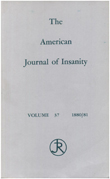Dose-finding trial of D-cycloserine added to neuroleptics for negative symptoms in schizophrenia
Abstract
OBJECTIVE: The authors conducted a dose-finding study of D-cycloserine, a partial agonist at the glycine site of the N-methyl-D-aspartate subtype of the glutamate receptor, added to conventional neuroleptics for schizophrenic patients with prominent negative symptoms. METHOD: Nine patients with schizophrenia completed consecutive 2-week trials of placebo and four doses of D-cycloserine. Clinical assessments were videotaped and were scored by a rater who was blind to temporal sequence. RESULTS: D-Cycloserine at a dose of 50 mg/day produced a significant reduction (mean = 21%, SD = 28%) in negative symptoms and significantly improved reaction time as measured by Sternberg's Item Recognition Paradigm, a test mediated in part by prefrontal cortex. CONCLUSIONS: This preliminary evidence suggests that D-cycloserine may improve negative symptoms and cognitive deficits over a narrow dose range when added to conventional antipsychotic agents.
Access content
To read the fulltext, please use one of the options below to sign in or purchase access.- Personal login
- Institutional Login
- Sign in via OpenAthens
- Register for access
-
Please login/register if you wish to pair your device and check access availability.
Not a subscriber?
PsychiatryOnline subscription options offer access to the DSM-5 library, books, journals, CME, and patient resources. This all-in-one virtual library provides psychiatrists and mental health professionals with key resources for diagnosis, treatment, research, and professional development.
Need more help? PsychiatryOnline Customer Service may be reached by emailing [email protected] or by calling 800-368-5777 (in the U.S.) or 703-907-7322 (outside the U.S.).



